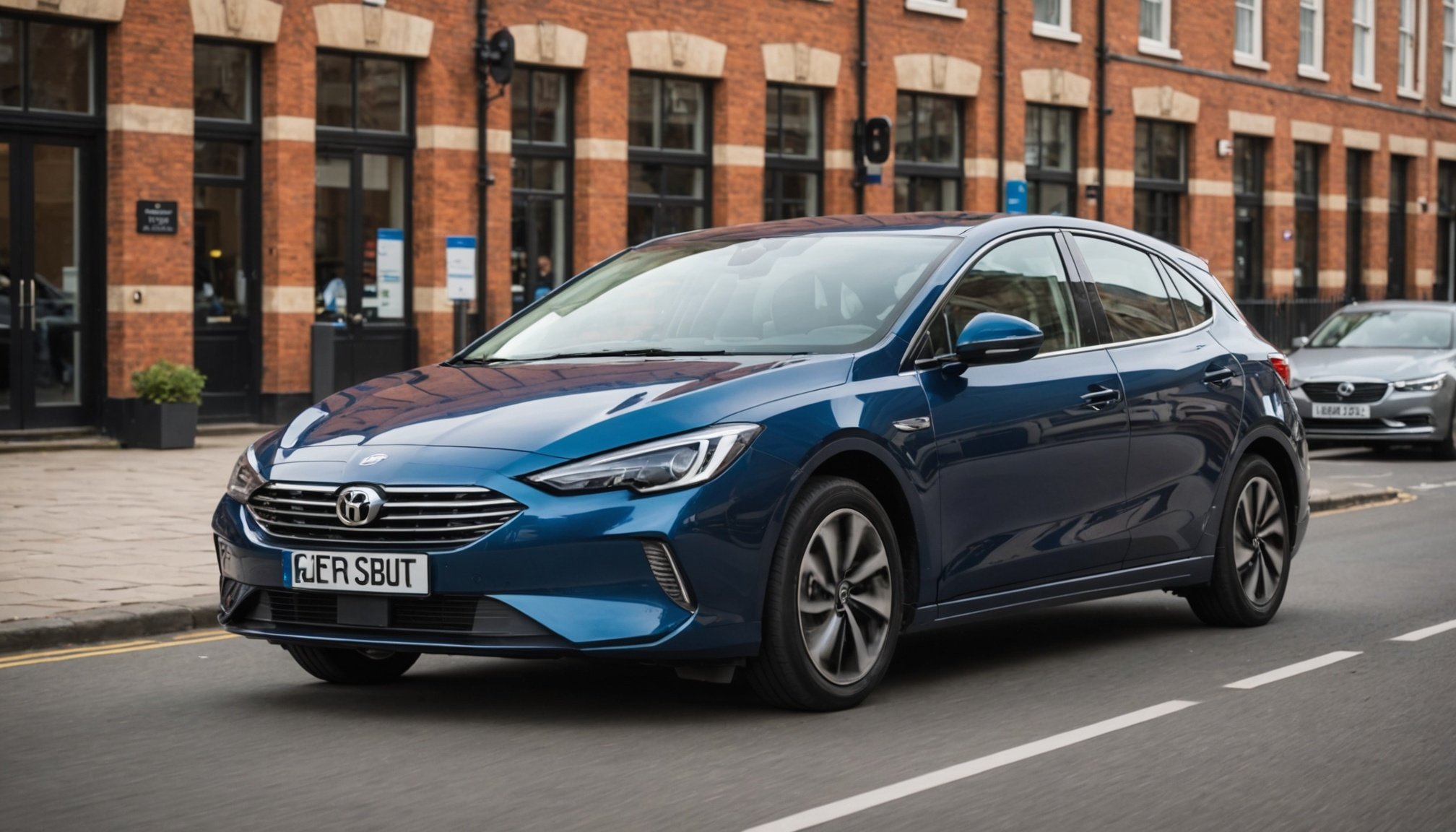Overview of Hybrid Cars
Hybrid cars represent a fusion of traditional fuel-based engines and electric technology, providing a balanced approach between environmental consciousness and performance. At the core of this innovation is the hybrid technology, which fundamentally combines an internal combustion engine with one or more electric motors. This combination allows for diversified power sources, reducing reliance on conventional fuels.
The major types of hybrid vehicles include mild hybrids, full hybrids, and plug-in hybrids. Mild hybrids utilise electric power to support the engine during acceleration and capture energy during braking, but cannot run solely on electric power. Full hybrids can operate on electric power alone, petrol, or a combination of both, optimising efficiency based on driving conditions. Plug-in hybrids, meanwhile, offer enhanced electric range, allowing for regular recharging from an external power source.
Also read : How brexit is transforming the uk’s automotive landscape: a deep dive
The evolution of hybrid cars has been remarkable, signalling a shift in the automotive market toward sustainability and efficiency. Early prototypes focused on reducing emissions and improving fuel economy, but modern hybrid models now offer advanced hybrid technology features such as regenerative braking and advanced energy management systems. As hybrid cars become more mainstream, they are reshaping consumer expectations and automotive design paradigms.
Benefits of Hybrid Cars for Commuters
Hybrid car benefits profoundly enhance commuters’ experiences with practical and environmental advantages. These vehicles are celebrated for their remarkable fuel efficiency, offering significant cost savings due to reduced petrol consumption. For daily commuters, this can result in substantial savings over time, as hybrid cars are designed to optimise energy use, especially in stop-and-go traffic common in urban areas.
Also to see : How brexit is transforming the uk’s automotive landscape: a deep dive
The environmental advantages of hybrid cars are equally noteworthy. By relying partly on electric power, they emit fewer pollutants, reducing their carbon footprint. This makes hybrids a compelling choice for eco-conscious commuters wishing to mitigate their environmental impact without sacrificing convenience or performance.
In urban commuting scenarios, hybrid cars shine through features like regenerative braking and seamless power transitions. These technologies not only enhance fuel economy but also offer a smoother ride. Additionally, their typically quieter operation contributes to a more pleasant driving experience in busy city environments, minimising noise pollution.
For those navigating metropolitan streets and seeking sustainable transportation solutions, hybrid cars strike a fine balance between practicality and ecological responsibility. As more people turn to these vehicles, the societal shift towards clean, efficient transport becomes ever more tangible, promoting a greener future.
Economic Considerations
When comparing hybrid car costs to traditional vehicles, the initial purchase price is often higher for hybrids. However, long-term savings can outweigh this initial expense. Fuel efficiency is a major advantage, with hybrids consuming less petrol over time, significantly reducing fuel costs. This can be especially beneficial with fluctuating petrol prices. The economic benefits extend to maintenance fees as well. Although hybrid cars may have higher upfront servicing costs due to advanced technology, they typically require less frequent maintenance than their conventional counterparts. The combination of regenerative braking and reduced engine strain supports this, often resulting in fewer mechanical issues and extended lifespan of components.
In the UK, commuters considering hybrids can also benefit from various government incentives. These can include grants, tax reductions, and exemption from congestion charges. Such incentives aim to make hybrids more financially appealing while promoting greener transportation options. As part of broader environmental policies, these incentives reduce the overall cost of ownership, potentially making hybrids a viable and attractive long-term choice for budget-conscious consumers. By considering both short-term and long-term economic factors, prospective hybrid owners can better assess the full financial implications of their purchase.
Comparisons with Traditional Vehicles
Hybrid vs traditional cars offer distinct differences primarily in terms of fuel economy and environmental impact. Hybrids typically achieve higher miles per gallon (MPG) due to their ability to switch between petrol and electric power, especially beneficial in urban stop-and-go traffic. For instance, a hybrid can reach an MPG of up to 50, while a traditional petrol engine averages around 30 MPG.
Performance-wise, hybrids excel with regenerative braking and seamless power transitions, offering a smoother driving experience. They often boast torque advantages at lower speeds, improving acceleration in tight city commutes. While traditional cars may edge out hybrids in raw engine power, hybrids provide a balanced approach that suits everyday driving needs.
Environmentally, hybrids showcase a significant reduction in carbon emissions. By using electric power at low speeds, they minimise fuel consumption, directly decreasing pollutants released into the atmosphere. This makes hybrids an attractive option for environmentally conscious drivers. In contrast, conventional vehicles rely solely on combustion, maintaining higher emission levels.
In conclusion, while traditional vehicles may still attract those seeking conventional performance, the long-term benefits of hybrids—in fuel savings and environmental footprint—make them a compelling choice for modern commuters.
Maintenance and Reliability
Hybrid cars present unique maintenance requirements compared to traditional vehicles, primarily due to their dual power sources—combustion engine and electric battery systems. Commuters considering hybrids should understand that while routine checks resemble those of conventional cars, special attention must be given to battery health and electrical components.
In the UK market, reliability statistics for hybrid models generally demonstrate strong resilience, often with fewer reported mechanical issues compared to standard cars. Their regenerative braking and reduced engine wear contribute to this reliability, ensuring components endure longer, thus lowering the frequency of repairs. However, potential concerns can involve electronics malfunctions or software updates, which require specialised service.
Battery life is a vital factor for commuters, with most hybrid batteries lasting between 8 to 10 years, depending on usage patterns and driving habits. The longevity of hybrid batteries is a significant consideration for prospective buyers, indicating fewer replacements and reduced long-term costs. Regular inspections and proper charging habits can extend battery lifespan, enhancing overall vehicle reliability for daily travel.
Understanding these aspects enables commuters to confidently navigate the maintenance landscape of hybrid cars, ultimately leading to an informed ownership experience.
Real-Life Commuter Experiences
Delving into commuter testimonials reveals the practical impacts hybrid vehicles have on everyday users. Many cite fuel efficiency as a standout benefit, often cutting their petrol expenses significantly compared to traditional cars. This resonates with users who primarily drive in urban settings, where stop-and-go traffic is prevalent. One user review highlights, “Since switching to a hybrid, my fuel costs have halved during my daily commute.”
The transition to hybrid cars receives praise for its environmental and economic facets. Hybrid car reviews frequently underscore the seamless driving experience characterised by smooth transitions between power sources. For many, the quieter operation stands out, enriching the commuter experience amidst urban noise.
Community perspectives on hybrid adoption have become increasingly optimistic, largely due to growing awareness and affordability. Users express satisfaction with the decision, often sharing insights on social platforms. User experiences regularly emphasize the convenience of features like regenerative braking and enhanced battery life. However, some still note initial price concerns, which are often softened by long-term savings and various government incentives.
Case studies show that while each hybrid journey is unique, the collective trend leans toward embracing hybrids as a cost-effective and sustainable alternative for daily commuting. Such testimonials point to a growing acceptance and appreciation among UK commuters.
Practical Tips for Commuters Considering Hybrid Cars
Navigating the landscape of hybrid cars can be daunting, but with the right guidance, you can make an informed decision. Hybrid car tips focus on understanding the essentials of your potential purchase. Begin by determining your daily commuting needs—consider the distance, driving conditions, and charging infrastructure available in your area.
For those aiming to optimise fuel efficiency, maintain a steady speed and gently accelerate. Hybrid models often provide dashboards displaying real-time energy consumption, helping drivers maximise efficiency. Additionally, utilise the regenerative braking whenever possible, as it not only saves fuel but also extends battery life.
Proper battery maintenance is crucial for longevity. Regularly inspect the battery system and adhere to recommended charging cycles. Overcharging or excessive drainage can reduce its effective lifespan. Refer to any manufacturer guidelines for optimal performance practices.
Commuter advice highlights the importance of selecting a model that offers the right balance of features and cost. Consider models that offer enhanced battery ranges if your commute involves longer distances. By evaluating these factors and following practical tips, you can enhance both the efficiency and enjoyment of your hybrid car experience.
The Future of Hybrid Cars in the UK
As the UK progressively embraces eco-friendly transport, the future of hybrid vehicles appears promising. Adoption rates among UK commuters are expected to rise, driven by increasing environmental awareness. Forecasts suggest a continuous shift in consumer preference towards hybrid cars, attributed to their optimal blend of performance and sustainability.
Advancements in automotive trends further enhance the appeal of hybrids. Emerging technologies like improved battery efficiency and advanced powertrains offer expanded driving ranges, giving them a competitive edge. As hybrids evolve, they are likely to incorporate connectivity features and autonomous driving capabilities, attuning to future market growth expectations.
Government policies play a substantial role in hybrid popularity. Potential incentives, such as tax breaks or subsidies, could accelerate adoption. The UK’s commitment to net-zero emissions by 2050 is expected to foster legislation favouring low-emission vehicles, subsequently impacting hybrid market dynamics. Policymakers might introduce stricter emission standards, further steering consumers towards hybrids.
In summary, the UK’s hybrid vehicles are poised for substantial growth, supported by technological advancements and favourable government policies. As consumer demand aligns with sustainability and innovation, hybrids are set to play a pivotal role in the nation’s automotive future.

